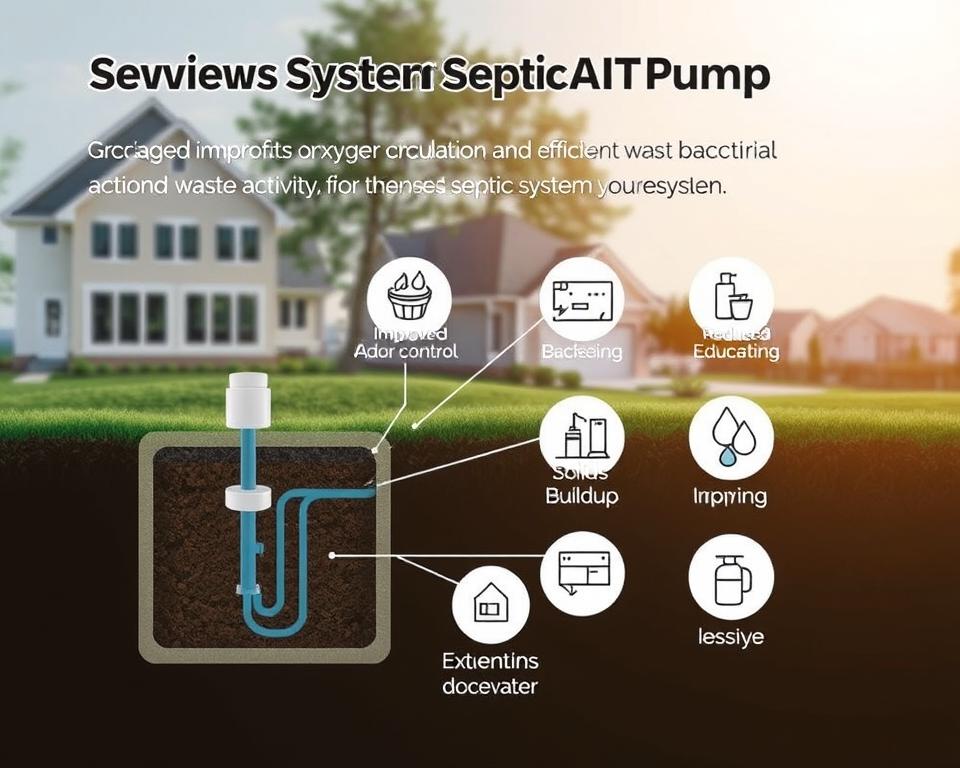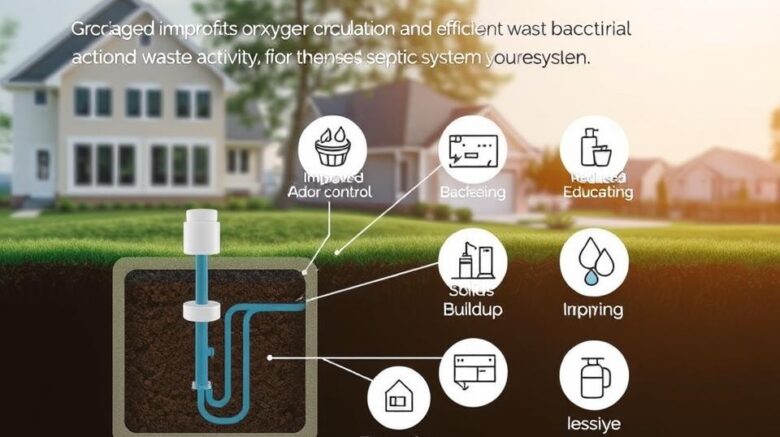Septic Tank Pump Out: Must-Know Advice & Guidance
Have you ever thought about just where your used water goes after it drains from your basin or toilet? It’s managed by a well-maintained septic system. Grasping the significance of septic tank pump outs is crucial for optimal waste management within your residence. Overlooking this may cause backups and pricy repairs. Our guide aims to highlight the importance of septic cleaning and routine pump outs. By utilizing trustworthy septic services – septic tank services in my area, you protect your property, nature, and ensure your system’s extended lifespan.
Core Insights
- Regular septic tank pump out avoids system failures and backups.
- Understanding your septic system supports effective maintenance.
- Scheduling a pump out is critical for sound waste management.
- Stay alert to signs that show your septic tank needs attention.
- Opting for a qualified service provider can enhance system efficiency.
- Paying for septic tank cleaning services defends your home and the environment.
The Importance of Septic Tank Pump Out
Arranging a septic tank pumping service on a schedule is critical for your system’s long life and function. Over time, your tank fills with solid waste and organic debris, and this can lead to performance issues or even complete system failure. Without septic system maintenance, you could face blocked pipes and ruined drain fields – problems that often come with sizeable bills and significant inconveniences to owners.
By having professional septic tank services handle routine maintenance, you make sure your system runs smoothly. This practice not only prevents pricey overhauls but also safeguards the soil and groundwater around your home from pollution. When you opt for regular pump outs, you advance environmental health and benefit from a reliable and effective system for managing waste.
Understanding Your Septic System
A typical septic system is pivotal in handling household wastewater. It’s constituted by the septic tank, drainfield, and soil – elements that function in tandem to effectively process waste. The septic tank offers a contained space for solid waste to dissolve biologically.
It’s important for homeowners to understand how these units work. Keeping the septic system in prime form is critical to its longevity and effectiveness. Through scheduled inspections and servicing the septic tank when necessary, owners can dodge costly breakdowns that could result in serious health and environmental issues.
Continuously maintaining your septic system protects your property and supports public health. Here, view a table outlining the different septic system components and their functions:
| Component | Function |
|---|---|
| Septic Tank | Holds and breaks down solid waste through anaerobic bacteria. |
| Drainfield | Filters the treated effluent into the soil for further filtration. |
| Soil | Acts as a natural filtering system to further treat wastewater. |
Knowing these elements underscores the need for diligent septic system care. Smooth operation requires consistent maintenance and cleanings by homeowners.
How Often Should You Schedule a Pump Out?
Knowing when to get your septic tank pumped is vital for its health. Generally, a septic pump out should occur every 3 to 5 years. However, a variety of factors might adjust this schedule.
The occupancy level in your home heavily influences the pumping frequency. More inhabitants mean more wastewater, leading to more regular maintenance. Moreover, habits like frequent washing or long showers might require sooner pump outs. Acting promptly can significantly prolong your septic system’s life.
It’s smart to factor in personal elements, such as tank size and daily water use, to maintain a proper schedule. Remembering your last pump out date aids in timely planning for the next one, ensuring uninterrupted system performance.
Indicators It’s Time to Pump
Homeowners should be vigilant for symptoms that signal their septic tank needs pumping. Slow-draining sinks and toilets often point to an overfilled septic system, impeding the wastewater flow. Moreover, bad smells around your home could indicate issues; they may emanate from the tank, showing system failure.
Visible wastewater pooling in the yard is another major indicator. If your lawn has soggy areas or unexplained puddles, it’s possible your septic system is overwhelmed. Dismissing these signs can develop into more serious issues that disturb your home and become costly to resolve.
To prevent serious complications, timely maintenance is crucial. Hiring a professional service like All in Sanitation can be a wise decision. They can properly diagnose and rectify these signs. This approach not only resolves immediate issues but also supports your system’s efficiency and health.

Choosing a Professional Septic Tank Pump Out Service
It’s important to choose a competent septic tank pumping service to maintain your system running smoothly. Reliable companies are familiar with the local regulations in depth, ensuring your septic system satisfies all requirements. A dependable service, like All in Sanitation, is committed to disposing of waste in an eco-friendly manner. This is critical for the environment’s well-being.
When searching for the right septic service, weigh these critical points:
- Experience and Reputation: Look for companies with positive feedback and long-standing success in your region.
- Licensing and Insurance: Confirm that your selected provider holds the proper license and insurance to cover unexpected problems.
- Comprehensive Services: Prefer a service that includes inspections with pumping, spotting issues before they grow.
Putting money into a quality septic tank pumping service wards off costly future repairs. Periodic evaluations and ongoing upkeep maintain your system in optimal condition. Picking carefully not only safeguards your investment but also supports a robust waste management system for your home.
Cleaning Your Septic Tank
For homeowners, septic tank cleaning is essential to ensure the system operates correctly. During this process, removing sludge and scum is crucial to stop blockages. A well-serviced system not only performs optimally but also lasts longer. Scheduling regular cleanings is vital for the health of your system.
Numerous owners add extra services to boost septic tank care. These add-ons are crucial for removing harmful bacteria and stopping residue build-up. Understanding the necessity of proper maintenance can save you from expensive fixes. Keeping up with maintenance guarantees both environmental safety and household well-being.
What Pumping Services Cost
Homeowners should understand septic tank pumping costs for effective system maintenance. Prices vary greatly due to area, tank size, and preferred service provider. Typically, this service costs between $200 and $600. It’s advisable to get estimates from multiple companies, considering both expertise and reliability.
Service providers like All in Sanitation supply affordable rates. Yet, the cost of septic tank cleaning mirrors service quality and thoroughness. Homeowners should consider these aspects thoughtfully when choosing a service.
Evaluating quotes helps smart selections that suit your budget and septic system needs. Knowing potential costs assists in financial planning for septic tank upkeep.
Homeowner Maintenance Tips
Maintaining your septic system well is vital. It guarantees a durable and effective setup. By implementing simple steps, the longevity of your septic tank improves, while also saving money. Measures like cutting back on water use in your household play a critical role. Repairing leaks promptly and choosing water-saving appliances are wise moves.
It’s important to not flush harmful substances down the drain. Chemicals, fats, or non-biodegradable items damage your septic system. For the integrity of your setup, get rid of such waste responsibly. This practice protects your septic tank’s natural processes.
Consistent inspections and the scheduled pumping are mandatory for septic maintenance. Plan to have your system inspected and serviced every three to five years. A maintenance schedule or checklist can be very useful. It helps owners in monitoring their system’s condition and following maintenance guidelines.
Acting ahead with septic maintenance delivers financial and environmental gains. Through adopting these habits, homeowners enhance their septic systems’ efficiency and dependability. This approach not only preserves your system but also supports a healthier environment.
In Summary
A septic tank pump out is essential for septic tank upkeep, and homeowners must take it with care. It wards off hefty bills and extends the system’s lifespan, ensuring effective operation long term. Recognizing when to respond to system distress signals protects your property.
Selecting a trusted provider, like All in Sanitation, changes the game in septic tank care. Their expertise guarantees proper service, backing both environmental health and your home’s comfort. Forward-thinking upkeep protects your investment and supports a greener planet.
Being knowledgeable about your septic system and its maintenance needs is crucial. Routine pump outs improve home functionality and reinforce public health. For any homeowner, grasping the value of septic tank care secures a efficient living environment for the future.
